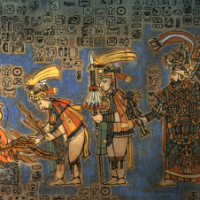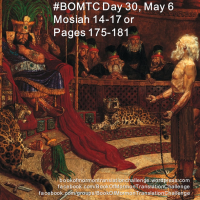For being such a short chapter, Mosiah 5 hits on some pretty essential and deep doctrines. King Benjamin speaks of being born again (born of God), adoption, and becoming children of Christ (See Romans 8 for more from the Apostle Paul on this).

Did you notice how many times the word NAME appeared in Mosiah 5? 12 times in 8 verses is a pretty obvious clue as to the intent of King Benjamin’s message. So, to answer Juliet’s question, “What’s in a name?”, the gospel answer is, “EVERYTHING!” The following is an excerpt from one of my favorite essays that helps me to understand the significance of King Benjamin’s teachings about the importance taking and keeping of the “name” of Christ. If you read this before your sacrament meeting, I hope that it will help the ordinance to be a bit more meaningful for you today:
“We Who Owe Everything to a Name”
He wasn’t of particularly august origins. His natural father was a local from a town north of Rome, so he really didn’t have any great connections. He had met Caesar once. Caesar had obviously been impressed about some qualities that he saw in the young man for he adopted him as his son in the will and made him his chief heir. Now, I should point out that in Roman eyes the legal adoption of a person gave that person every claim not just to the property and patrimony of the adopting party, but also to the heritage, the political connections, the name, the dignitas, everything else that came with the adoption. The Romans really made no serious distinction between a natural and an adopted son. It wasn’t considered like the adopted son was an imposter or some kind of a late claimant. He was simply considered as if he had been born of the adopting party. And so Gaius Octavius, at that time, when he became adopted, took the name Gaius Julius Caesar Octavianus. Historians refer to him as Octavian, but he called himself Caesar, son of Caesar, and that name made all the difference. The men who had been loyal to Caesar flocked to him. Slowly his power grew. Inevitably Mark Anthony and Octavian clashed, fought, and Anthony was beaten. Octavian became Augustus Caesar, the first emperor of Rome, the man who ordered the census that took Joseph and Mary to Bethlehem. Fascinating! It was Cicero who recorded Mark Anthony’s comment on their fates. Octavian was “that boy, who owes everything to a name!” The phrase reverberated in my mind and heart. Didn’t I owe everything to a name? Hadn’t my father given me the good life I had by making me his, by adopting me? It was later that I discovered the Apostle Paul’s use of the term adoption in reference to our relationship with Christ. The word adopt or adoption does not appear in the Old Testament, with its kinship obligations to orphans, nor is it found in the Book of Mormon, whose laws and social customs were derivative of Mosaic Law. But Paul understood the implications of being an heir by adoption. He, though a Jew, was a Roman citizen in a Roman world. And he used the implications of Roman law to explain to the gentiles the inheritance they might receive through the gospel’s new covenant in Christ’s blood. “For ye have not received the spirit of bondage again to fear; but ye have received the Spirit of adoption, whereby we cry, Abba, Father” (Romans 8:15)… It is Christ who makes us his heirs. He becomes our father, as King Benjamin explains: “Because of the covenant which ye have made ye shall be called the children of Christ, his sons, and his daughters; for behold, this day he hath spiritually begotten you; . . . ye are born of him and have become his sons and his daughters” (Mosiah 5:7). (Lynda Mackey Wilson, “We Who Owe Everything to a Name“, BYU Studies 47, no. 2 (2008))

This chiasm from Mosiah 5:10-12, discovered by John W. Welch in 1967, “successfully builds to its climax and intensifies its final exhortation against transgression by the striking introduction of these carefully chosen and intentionally reiterated terms.” Since the initial discovery of this chiasm, Welch and other scholars have extensively analyzed the presence of chiasmus and other Hebrew poetic structures in the Book of Mormon, including their important roles in communicating textual meanings as well as their significance for locating the book’s cultural and literary historicity.
Want to know more? Check this out:
- KnoWhy: Mosiah 5:11, Why Did King Benjamin Use Parallelisms So Extensively in His Speech?
- KnoWhy: Mosiah 6:6, Why Were Benjamin and Mosiah Such Beloved and Effective Leaders?
- KnoWhy: Mosiah 7:9, Why Are Mormon’s Extensive Quotations of Limhi Significant?
- How the Book of Mormon Transforms You
Please leave your thoughts about a special verse, teaching, etc. that you enjoyed at one of the following:
REPLY at the bottom of each post at: bookofmormontranslationchallenge.wordpress.com
LIKE our Facebook page and post at: facebook.com/BookOfMormonTranslationChallenge
JOIN our Facebook group and share at: facebook.com/groups/BookOfMormonTranslationChallenge
TWITTER and INSTAGRAM users can use #bomtc for related posts: twitter.com/brosimonsays | instagram.com/brosimonsays







April 9th, 2018 at 8:45 AM
Wow!!! I never quite saw it that way. What is in a name? I owe everything to who’s name I bare!
LikeLike
April 10th, 2018 at 9:09 PM
So true! I’m eternally grateful for the spiritual adoption to Christ that allows us to inherit all that the Father has because Jesus is willing to take us and cover us with His “name”. Keep looking for this doctrine as you study the scriptures 🙂
LikeLike